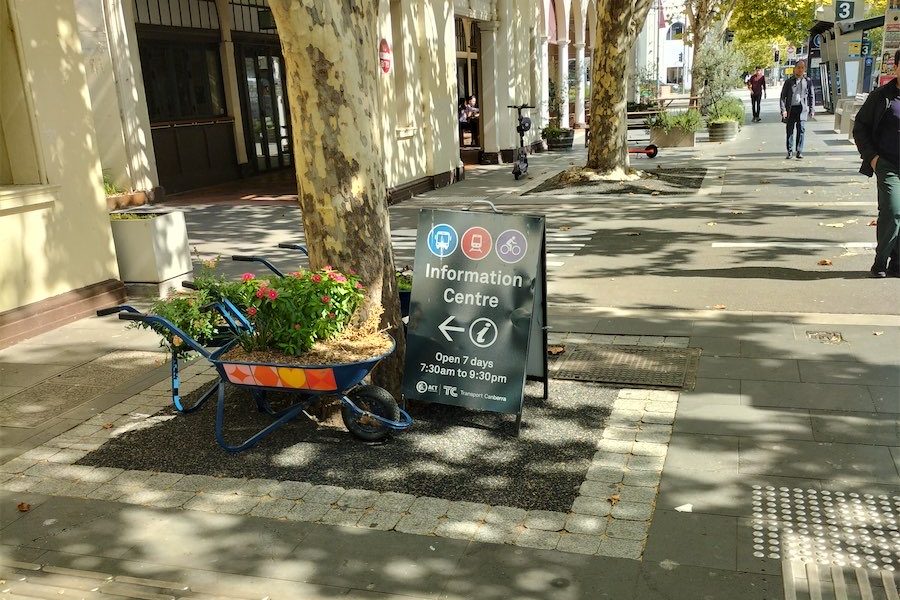Letter writer MIKE QUIRK, of Garran, in the name of credibility, calls on the chief minister to reveal the details of the “political polling” he has been quoting from recently…
ANDREW Barr, when discussing his government’s performance on ABC local radio on October 17, claimed the preference of Canberrans was to live in higher-density housing in established areas and they supported light rail. He said the results were based on political polling.

If Mr Barr is to have credibility, he needs to release details of the polling including its sample size and the questions asked.
His claim that Canberrans want to live in higher-density housing is suspect with the high, largely unmet demand for detached blocks when they are released, indicating many households are willing to trade off extra travel for a more suitable dwelling.
A 2015 Artcraft Research report undertaken for the ACT government indicated a strong preference for detached housing by those surveyed. The unmet detached demand suggests the government should consider reducing its arbitrary 70 per cent infill target.
Mr Barr identified infill can provide substantial infrastructure cost savings. The extent of savings will depend on the amount of underutilised infrastructure and the level of augmentation required. Such analysis and the costs of developing greenfield developments needs to be undertaken to enable reliable comparison of their relative costs of development.
Infill can deliver environmental benefits by enabling people to live close to work and reduce the need for travel, but they can be overstated. Such benefits can be attained in greenfield areas if governments direct employment and ensure the timely provision of community and retail facilities.
It also needs to be established greenfield areas such as Kowen have major environmental constraints and the per capita water and energy use is lower in high-density dwellings.
Infill developments can also have negative environmental impacts from increased congestion, loss of tree cover, the development of heat islands and the creation of substandard living environments. “Gentle urbanism” can be brutal if poorly managed.
In contrast to its concern about the high costs of greenfield development, the government is relaxed about the high cost of light rail when compared to bus-based alternatives and the resultant diversion of funds from high-need areas of housing, health, education, city maintenance and public transport. I wonder if those polled by ACT Labor were informed of these consequences.
Furthermore, Mr Barr argued light rail was supported by the community in the recent election down-playing the wide range of factors influencing voting including the unelectability of the socially conservative Canberra Liberals.
It is outrageous Mr Barr is relying on highly suspect surveys to justify his urban development and light rail policies. His decisions should be based on detailed assessments to ensure limited funds are spent to maximise benefits to the community.
Mike Quirk, Garran
Why I resent paying my rates
IT’S that time of year for my rates to be paid and I’ve never felt so resentful doing so.
If only I knew my money wouldn’t be mismanaged and misspent on useless things like this pathetic tram business, not contributing to improving the woeful state of the Canberra Hospital and recently, spent on policy change to decriminalise meth and heroin!
I guess that’s more votes from the hapless drug users Labor/Greens can count on. Oh! And contributing to the wages of a useless, ineffective ACT Integrity Commissioner (who, quite frankly, looks more like an extra in a Western film than in charge of keeping the ACT government on the straight and narrow).
PLEASE Liberals! Give the ACT something – someone – to vote for in 2024 that has backbone and policies that are community oriented and logical!
Bec Henson, Hughes
The Voice is a dead horse
ROBERT Macklin’s rosy vision (“The vision splendid for a republic starts here”, CN October 13) isn’t rosy for me.
If The Voice isn’t a dead horse already then it should be. I don’t want to swap blue blood for black blood with an Uncle Charles-like figure replacing King Charles. Neither please!
Any hint of legal-political discrimination based on race/culture/religion is an extremely bad idea. Why are we casting Aboriginal people as permanent victims with white people as their permanent oppressors? Where do Asian people fit in this foolish schema?
The Voice (a cousin to “white guilt”) is an emotional response to complex problems that require rational responses. The fundamental absurdity of The Voice is that there is no “Voice”, and for obvious reasons – just like other humans, Aboriginal people vary in their views, eg our most outspoken Aboriginal parliamentarians: Lidia Thorpe, Linda Burney and Jacinta Price.
The future grotesquery surrounding “Voice Citizen Identification” doesn’t bear thinking about. Whatever your hereditry, let people just be people in our polis. No matter what the problem, that is “all ye need to know”.
Peter Robinson, Ainslie
Mr Roberts, we need you!
GENTLE readers may recall my amazement and envy at discovering that planning and development decisions in the Waverley Council area of Sydney are everything they are not here in our “guided democracy”: consultative (the real sort), democratic (idem), inclusive, flexible and impartial.
But, you might have thought: Waverley is only one – perhaps uniquely blessed – council in a big city where, surely, powerful agendas and interests may be expected generally to prevail.
But lo, ’tis not so! The very Minister for Planning in NSW (one Anthony Roberts) is poised to reject a plan by his bureaucrats and their developer for an overly high, mega-luxurious apartment building in Barangaroo. For such a prime location, the dollars involved must be dizzying.
Well done, Mr Roberts! And if you ever fancy a move to ACT politics, I for one I (and there are many disaffected like me) will surely vote for you.Your country – or at least the quaint, once-beautiful satrapy where its capital resides – hath need of you and others like you.
John Griffin, via email
The time for fossil fuels is gone
VI Evans (Letters, CN October 13) doesn’t seem to know the difference between the past and the future. She also seems to think that one can separate different aspects of an issue, focus on one and ignore any others.
Yes, humans have used fossil fuels, along with other basic materials and combustibles, and solar, wind, hydroelectric, nuclear and geothermal power, to achieve many things in the past and continue to do so. However, what we can do with any of these must be balanced with all the other aspects of their acquisition, processing and use, especially the negative, detrimental ones.
Fossil fuels and other basic materials and combustibles have certainly played major roles in human technological advancement to this point, but must be considered transitional. Their time is well past.
The fact that their exploitation helped get us to this point doesn’t mean that we should continue to rely on them. To want to do so, simply because we have in the past, is folly. We are now increasingly able to move beyond them to do all of the things to which Ms Evans refers, with much less damage to ourselves, our fellow creatures and the environment.
Our collective future relies on hastening the pace and comprehensiveness of these developments.
John M Schmidt, Monash
Our priority is to climate-proof Australia
I REFER to the two letters in the October 13 edition of “CityNews”, by Vi Evans and Gavin O’Brien.
As Ms Evans is correct to say how the world is highly dependent on fossil fuels for most modern household, commercial and industrial products – that is not about to change. And could have added that production is still largely dependent on electricity generated from fossil fuels.
Mr O’Brien, although stating he is not an engineer, an economist or medical specialist, claims to be “certain” that “the reliability or cost of renewables [why not both?] far outpaces the unviable use of non-renewable sources” [of electricity, I presume]; I would grant him having faith perhaps but not “certainty”.
Like many proponents, Mr O’Brien seems to be under the illusion from much misinformation that renewables are cost-free, which they certainly are not.
Note the capital cost in billions and emissions to make and install wind and solar farms. Note the $20 billion in new distribution poles and wires needed to connect users to remote renewable sites. Note the productive land that is being covered with solar farms. Note that the billions invested in renewables will have to be repeated every 20-25 years and turbine blades every 10 years. Note the environmental damage from mining and manufacture caused by production of renewables and their repeated disposal.
In contrast, nuclear generators take up minimal space, last three times the life of other renewables and would obviate the $20 billion for poles and wires.
But the killer is that no matter what Australia does and spends on renewables in the hope of reducing greenhouse gas emissions, it will have zero effect on global warming let alone climate change. Our priority is to climate-proof Australia, not waste billions on wind and solar renewables and attendant infrastructure for zero return.
Max Flint, Erindale
Days of fossil fuels are numbered
VI Evans (Letters, CN October13) has, perhaps unintentionally, pointed out the imprecise use of language in my letter of September 22. Ms Evans is correct to point out that many of the objects and materials we take for granted these days are made partly or entirely from fossil fuels, in particular petroleum.
However, she seems not to have noted my use of the term “fuels”. This indicates unambiguously that the fossil substances – coal, oil, petroleum gas and coal seam (or natural) gas – are burnt to make use of their latent heat content. This is the process that produces carbon dioxide (CO2), the major cause of global heating.
Ms Evans also refers to steel in connection with fossil fuels – in this case, metallurgical coal. There is a move afoot in Australia, led by Andrew Forrest and Fortescue Future Industries, to make steel using “green” hydrogen, from solar and wind energy. This is also happening in the EU.
The days of coal, including metallurgical coal, are clearly numbered. With the advances in electric vehicle technology, and manufacture at commercial scale, the days of petrol and diesel are also numbered.
Dr Douglas Mackenzie, Deakin
China’s doubling nuclear power capacity
DR Douglas Mackenzie in his letter (CN October 13) says China currently has no plans for “nuclear-powered electricity”. I assume that means that currently China is not using nuclear power to produce electricity.
The World Nuclear Association website says that in 2019 China produced 348 terawatt hours of “nuclear-powered electricity”, five per cent of its electricity production.
The website also says: “The impetus for nuclear power in China is increasingly due to air pollution from coal-fired plants.”
Nikkei Asia in an article dated April 22 says: “The Chinese government has approved the construction of six reactors as part of a plan to reduce carbon dioxide emissions by more than doubling nuclear power capacity this decade.”
According to the article, at the end of 2021 China had 53 nuclear power plants with a total generating capacity of about 55 gigawatts. A Bloomberg article, dated November 2, states: “China is planning at least 150 new reactors in the next 15 years, more than the rest of the world has built in the past 35.”
Chris Rule, Conder
It’s about more than the stars
BUMPING up dwelling EERs by a notch is a relatively easy task for state and territory ministers, and no doubt can be very beneficial for individual occupants of new homes if the higher standards are consistently monitored and enforced.
However, EER box ticking does not address the wider public costs of having larger homes on smaller blocks, siting towering high-rises with small and generally hard-surfaced surrounding footprints, having fewer trees able to shade private land and large, hard heat-retaining vertical walls and ground-level surfaces, allowing swathes of new suburbia to still face east-west, approving the use of dark roofing and having too few and also poorly-sited street and other public-space trees with wide canopies.
Our ministers and planning authorities cannot afford to turn a blind eye to the need for all urban densification areas to at least include bigger setbacks, and substantial additional and adjacent open, green and well-treed spaces for the use, comfort and well-being of not only thousands of new residents but also the greater number already living nearby.
The tunnel-visioned, yet lucrative focus on cramming in more “residential, residential and residential” at the expense of anything else, means a poor start already on mitigating the urban heat generation and heat trapping that is occurring across these large precincts and beyond. It is hard to have faith that many of the above contributing factors will be counteracted in timely and less piecemeal ways, not only by the still obtuse ACT planning reform package but also by the ACT government’s many existing plans and strategies that modestly aim to increase our urban forest, cool the city, ensure tree canopy for residential blocks and improve liveability and well-being in general.
The public deserves more honesty and transparency from ministers and local MLAs about progress made on addressing these physical liveability and amenity issues, well before the next election.
Sue Dyer, Downer
Inspiration for cartoonist Dorin
PLEASE could cartoonist Paul Dorin try drawing a tram vehicle speeding up tracks pointing into the sky from London Circuit. At the windows are the aghast pro-light rail politicians. A “flying boat” or sea-plane just might be waiting below on Lake Burley Griffin to rescue them.
Rosemary Blemings, via email
The ghost town that is Civic
CIVIC is fast becoming a ghost town and many parts are akin to a garbage dump.
We can thank the dictatorial duo, Chief Minister Andrew Barr and Mick Gentleman, Minister for Planning and Land Environment for that, owing to their ongoing love affair with greedy ACT developers, and particularly the indiscriminate use of the diabolical, undemocratic call-in powers by the minister.
The sooner Andrew, Mick and the call-in powers are removed, the better it will be for Canberrans.
Mario Stivala, Belconnen
Keating should apologise to King Charles
ALTHOUGH he has become very bitter in his old age, there is one thing that Paul Keating has not lost, and that is his penchant for purposefully misinterpreting comments by others to suit himself.
In his talk given at La Trobe University on Wednesday, October 12, he proclaimed in Keatingesque style that: “If Australians have so little pride in themselves, so little pride that they are happy to be represented by the monarch of Great Britain, why would somebody like me want to shift their miserable view of themselves.”
He also said, wrongly, that he believed the royal family would have been “so glad for the referendum to have passed” and for Australia to break away.
Just because the Queen had stated that change to a republic was a matter for the Australian people themselves to decide and that she would accept the decision of the Australian people whatever it may be, in no way means that neither she nor any member of the royal family would have been “so glad for the referendum to have passed”.
To say so demeans Mr Keating himself and the Labor Party in general for propagating fiction to support their push for a republic.
Mr Keating also conveniently forgets that it was his icon, former Labor prime minister, Gough Whitlam, who declared that the Queen in Australia was Queen of Australia.
Mr Keating should apologise both to the King and to the Australian people for these falsehoods.
Philip Benwell, chair, Australian Monarchist League
We must preserve our democratic constitution
I AM very grateful to have my little essay on the repugnancy of the word “republic” published (“When a republic seems repugnant”, CN October 15).
But I must object! And I must do it quickly before I am attacked by a horde of angry, red-bandanna-ed, axe-wielding activists who wish to deal with me like a King Charles I.
In the introduction you described me as an “unashamed monarchist” and yet the article was entirely about the peaceful transition to self rule that we have enjoyed and the fear that we would fall into a constitutional staked pit, like so many nations under a presidential regime where autocracy is a risk.
I may be a monarchist or I may not – that is immaterial – but what we must do is preserve our incredibly robust and democratic Australian Constitution.
Why should we identify ourselves with these other rabid regimes when we are (and very dignified it sounds, too) already called the Commonwealth of Australia? There is no Britain in that.
Or should we change so that we can be known as the Democratic Peoples’ Socialist Republic of the Commonwealth of Australia?
Richard Forster, via email
Learning comes before perfection
TO Colliss Parrett (“Shocked by weekly road crashes”, Letters, CN October 13): Despite your near 3/4 century of driving experience, it seems to have escaped your notice that most of us need to learn how to do things before we become as perfect as you claim to be.
Perhaps we should have you instruct all new drivers in the ACT to address the issues you describe.
Peter McKinlay, Gunning
Who can be trusted?
In a world of spin and confusion, there’s never been a more important time to support independent journalism in Canberra.
If you trust our work online and want to enforce the power of independent voices, I invite you to make a small contribution.
Every dollar of support is invested back into our journalism to help keep citynews.com.au strong and free.
Thank you,
Ian Meikle, editor





Leave a Reply